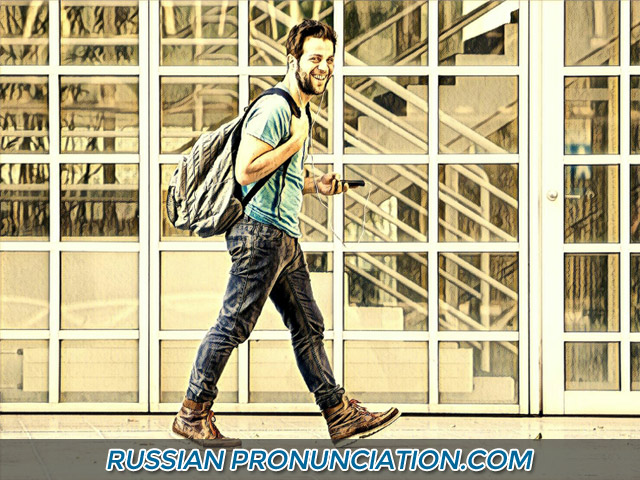
Full Episode Audio
Exercises Only Audio
Download Full Episode (right click save-as)
Today I’d like to return to the topic of voiced and devoiced consonants, looking at other letters this time, and more importantly, examining how it works within consonant pairs and clusters. We recall that in an unfamiliar word, it’s often very hard to guess the last letter. Take the Russian word: дуб
Is that word spelled Д-У-П ? – which is how it sounds – or Д-У-and a devoiced ‘Б’? Hearing the word in isolation like that, there’s no way to know.
The issue here isn’t so much of developing our pronunciation. I mean, it’s no challenge to say the word дуб. The issue is realizing that what sounds like, for ex, a Z might simply be a voiced S. Or what sounds like a T might be a devoiced D, and so on. This not only helps with reading, of course, but with comprehending the things we hear.
So let’s get to work. What I want to uncover is the pattern behind voicing and devoicing when consonants are grouped together. Tell me: The Russian letter ‘В’…is it voiced or devoiced? Put a hand to your vocal cords…Right. So spoken in isolation, ‘B’ is voiced. But listen to it here:
Я иду в Старбакс.
That was four words: Я…иду…в…Старбакс. That ‘F’ sound right before Starbucks was actually our Russian ‘В’. It was devoiced. But why?
Let’s look at the phrase again but instead of saying Starbucks, let’s say: I’m going to McDonalds.
Я иду в Макдоналдс.
Again, it was four words: Я…иду…в…Макдоналдс. Suddenly our Russian ‘В’ is now voiced? What’s going on? Let’s look at some more examples. All of the following words will start with the Russian ‘В’. Tell me if it’s voiced or devoiced. Ready?
волк…VOICED
вообще…VOICED
все…VOICELESS
вторник…VOICELESS
вполне…VOICELESS
взаимно…VOICED
вдали…VOICED
вместе…VOICED
What’s going on with those three words where the В was devoiced?
все – вторник — вполне
Hmm…I think I see a pattern: In Russian, voicing is determined by the last letter in a cluster.
Take that first one: все
Do you hear that ‘S’ sound? That letter—which looks like the English letter ‘C’—is naturally voiceless. That causes the В to devoice, making it an F sound.
And the next word: вторник Again, the В becomes a voiceless F sound because the T that follows it is naturally voiceless.
And the next word: вполне The П which follows is naturally voiceless, and that devoices the В into an F.
Similarly, if the last consonant in a pair or cluster is voiced, then so are the ones preceding it….if possible. So we heard: взаимно. That 2nd letter is a Z (З) …naturally voiced, which voices our В as well.
Then we heard: вдали. That 2nd letter Д is naturally voiced, which voices our В as well.
And we heard: вместе The M is voiced, and therefore so is our В.
For our official phrases, let’s use those that we heard at the start. I’m going to Starbucks.
Я иду в Старбакс.
The ‘В’ is devoiced here—it’s an ‘F sound. Why? Because the consonants that follow—the ‘ST’ (Ст )of Старбакс, are voiceless. But if we’ going to McDonalds…
Я иду в Макдоналдс.
It’s a voiced ‘В’ sound. Why? Because the M of Макдоналдс is voiced. So basically, voicing shoots backwards from the end of the group.
How about the phrase: I’m going to the theater. Will the ‘В’ be voiced or devoiced? Hit pause and think about it. Listen…
Я иду в театр. Devoiced into an ‘F’ sound, because the ‘T’ of театр is voiceless.
How about: I’m going to the park.
Я иду в парк. Again, ‘F’ park…an F sound because the П in парк is voiceless.
What if you’re going to the bank?
Я иду в банк.
Now it’s V bank…voiced, because the ‘Б’ in банк is voiced.
Let’s work with a new letter. The Russian Д. On its own, it’s voiced. Like in these words…
долго
дар
Дима
But if it’s followed by a voiceless consonant? What sound will it become? Hit pause and think about that. Answer: The letter Д devoiced will sound like a T. Take the word ‘vodka’ which, in Russian, is: водка…(sounds like “вот-ка”). Because that ‘k’ is voiceless, it forces the Д to sound like a T.
In Episode 13, if you recall, we worked with the letter Ж. On its own, it’s voiced. Like in these words…
жар
жить
But if it’s followed by a voiceless consonant, how will it sound? Hit pause and think about that. Devoiced, the letter Ж sounds like “sh” (Ш). Listen to the following word, spelled L-O-ZH-K-A
ложка
Again, the ‘k’ is naturally voiceless, which turns the Ж into a Ш.
All of this works in reverse. If the last letter is voiced, then voiceless consonants change into their voiced counterpart…if there is one. Take the Russian letter ‘C’. On its own it’s voiceless. Like in these words…
сад
сорт
сила
But if it’s followed by a voiced consonant, how will it sound? Like in English, a voiced S (C) sounds like a Z. Think of the word dogs (sounds like dogz). The following word starts with the letters С then Д. Listen: сделать
Since ‘Д’ is naturally voiced, the С sounded like a Z (З)…Z-dyelat. If I asked my little boy to write out that word (сделать) I’m sure he’d use a Z (Зделать) because that’s how it sounds.
These are not hard and fast rules. Some voiced consonants never change, no matter what. But I’m not going to list a bunch of rules for you to memorize, because that’s not how language is learned. We’re just pointing out the patterns, and trying to apply them to new situations.
Before we go, how would you say: I’m going to the center.
What sound will the letter ‘В’ have?
Я иду в центр.
Great job. See you in the next episode!
Podcast: Play in new window | Download

